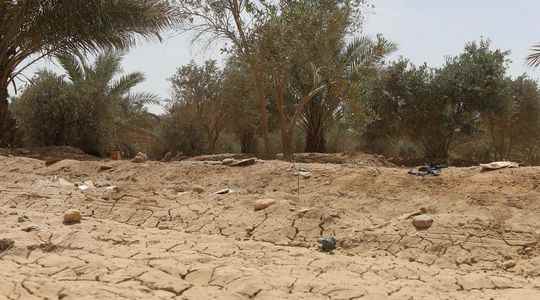After two weeks of negotiations, the 15th Conference of the Parties (COP) of the United Nations Convention to Combat Desertification ended on Friday, May 20, in Abidjan, Côte d’Ivoire. Decisions have been made even if, in the end, few concrete measures are to be highlighted.
“Restore one billion hectares of degraded land by 2030”
Among the commitments made by the 196 participating States, let us first mention “accelerating the restoration of one billion hectares of degraded land by 2030”. During the closing press conference, Ibrahim Thiam, executive secretary of the UNCCD, quoted by AFP, particularly insisted on the importance of this measure in the fight against climate change: “If we restore the land, we reduces emissions (of CO2) and brings them back into the ground.” Jean-Luc Chotte, president of the French Scientific Committee on Desertification, also reminds L’Express that “food security depends first on the quality of the soil”.
For him, this objective concerning degraded land is “ambitious and has the advantage of setting a clear objective: the neutrality of land degradation”. As a reminder, according to a UN report published at the end of April40% of the land in the world would be damaged and half of humanity would suffer.
Although the coordinator of the Sahel desertification network, Manon Albagnac, also welcomes “the commitments made in terms of hectares to be restored”, she regrets “the lack of quantified objectives in the short and medium term, which would have made it possible to monitor the evolution of the restoration of these lands”. “We can welcome the decisions that have been taken, but now we will have to ensure that they are applied. Nothing has been amended in this direction”, she explains.
She nevertheless appreciates that a guideline has been added to the final declaration of the convention “in favor of more sustainable agricultural production methods”. “Intensive agriculture, she recalls, is largely responsible for soil depletion”.
“Promote access to land”
Two advances in land management are also noteworthy. First of all, taking into account – this is a first – the importance of securing access to land: “This question is central in certain countries of the Sahel, where pastoralism is threatened by conflicts, climate change and/or land grabbing. Herders must be able to access the land without fear of being driven out overnight”, explains Manon Albagnac. “It’s crucial, abounds the researcher Jean-Luc Chotte. We cannot fight against desertification without worrying about securing and using the land.”
Another point to note: the promise made to improve “the involvement of women in land management”. On this subject, the Sahel Desertification project manager recalls that “in more than a hundred countries around the world, women still cannot inherit land from their husbands if the latter die.”
“Building resilience to drought”
The participants also pledged to “strengthen resilience to drought by identifying the expansion of drylands”. COP15 in Abidjan opened on May 9 in the presence of nine African heads of state, who highlighted the negative effects of drought and desertification for their continent and the “urgency” to remedy.
The host of the summit, the Ivorian President Alassane Ouattara, also underlined that the conference was being held “in a context of climate emergency which has a severe impact on our land management policies and exacerbates the phenomenon of drought”. The President of the Democratic Republic of Congo (DRC), Félix Tshisekedi, had pointed to “the lengthening of the dry seasons” in Africa and “the advance of the Sahara and Kalahari deserts”.
But “faced with the urgency and the height of the stakes”, Manon Albagnac deplores here “a missed meeting”: “There was no momentum on the part of the international community to make the drought top priority,” she said. Several actors, in particular African countries, hoped that an additional drought protocol, on the same model as that of Kyoto (which concerns greenhouse gas emissions) would be associated with the United Nations Convention to Combat Desertification . This will not be the case. Several Western countries, notably the United States, have opposed it. This instrument, which is legally binding, could have freed up additional funding to fight drought and encourage States to set up national action plans. Result: the subject was returned to the negotiating table for COP 16. It will take place in Saudi Arabia in 2024.
